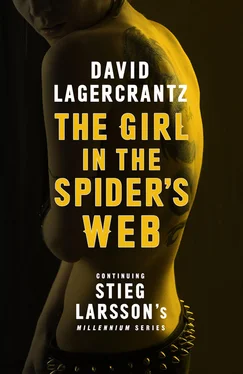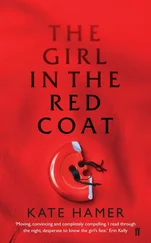“Did you put Balder’s technology up for sale on Darknet?” she said.
“No, I was just casting about. I was pissed off. You know, Frans hardly even said hello to me. He treated me like dirt, and he didn’t really care about that technology of his either. It had the potential to make all of us rich, but he only wanted to play and experiment with it like a little kid. One evening when I’d had a few drinks I just chucked out a question on a geek site: ‘Who can pay good money for some revolutionary A.I. technology?’
“And did you get an answer?”
“It took a while. I had time to forget that I’d even asked. But in the end someone calling himself Bogey wrote back with some pretty well-informed questions. At first my answers were ridiculously unguarded, but soon I realized what a mess I’d got myself into, and I became terrified that Bogey would steal the technology.”
“Without you getting anything for it.”
“It was a dangerous game. To be able to sell Frans’ technology I had to tell people about it. But if I said too much then I would already have lost it. Bogey flattered me rotten — in the end he knew exactly where we were and what sort of software we were working on.”
“He meant to hack you.”
“Presumably. He somehow managed to get hold of my name, and that floored me. I became totally paranoid and announced that I wanted to pull out. But by then it was too late. Not that Bogey threatened me, at least not directly. He just went on and on about how he and I were going to do great things together and earn masses of money. In the end I agreed to meet him in Stockholm at a Chinese boat restaurant on Söder Mälarstrand. It was a windy day, I remember, and I stood there freezing. I waited more than half an hour, and afterwards I wondered if he had been checking me out in some way.”
“But then he showed up?”
“Yes. At first I didn’t believe it was him. He looked like a junkie, or a beggar, and if I hadn’t seen that Patek Philippe watch on his wrist I probably would have tossed him twenty kronor. He had amateur tattoos and dodgy-looking scars on his arms, which he waved about as he walked. He was wearing this awful-looking trench coat and he seemed to have been more or less living on the streets. The strangest thing of all was that he was proud of it. It was only the watch and the hand-made shoes which showed that he had at some point managed to lift himself out of the gutter. Other than that, he seemed keen to stick to his roots. Later on, when I’d given him everything and we were celebrating our deal over a few bottles of wine, I asked about his background.”
“I hope for your sake that he gave you some details.”
“If you want to track him down, I have to warn you...”
“I don’t want advice, Arvid. I want facts.”
“Fine. He was careful,” he said. “But I still got a few things. He probably couldn’t help himself. He grew up in a big city in Russia, though he didn’t name it. He’d had everything stacked against him, he said. His mother was a whore and a heroin addict and his father could have been anybody. As a small boy he had ended up in the orphanage from hell. There was some lunatic there, he told me, who used to make him lie on a butcher’s slab in the kitchen and whipped him with a broken cane. When he was eleven he ran away and lived on the street. He stole, broke into cellars and stairwells to get a little warmth, got drunk on cheap vodka, sniffed glue and was abused and beaten. But he also discovered one thing.”
“What?”
“That he had talent. He was an expert at breaking and entering, which became his first source of pride, his first identity. He was capable of doing in just a few seconds what took others hours. Before that he had been a homeless brat, everyone had despised him and spat at him. Now he was the boy who could get himself in wherever he wanted. It became an obsession. All day long he dreamed of being some sort of Houdini in reverse — he didn’t want to break out, he wanted to break in. He practised for ten, twelve, fourteen hours a day, and in the end he was a legend on the streets — or so he said. He started to carry out bigger operations, using computers he stole and reconfigured to hack in everywhere. He made a heap of money which he blew on drugs, and often he was robbed or taken advantage of. He could be clear as a bell when he was on one of his jobs, but afterwards he would lie around in a narcotic haze and someone would walk all over him. He was a genius and a total idiot at the same time, he said. But one day everything changed. He was saved, raised up out of his hell.”
“How?”
“He had been asleep in some dump of a place that was due to be pulled down, and when he opened his eyes and looked around in the yellowish light there was an angel standing before him.”
“An angel?”
“That’s what he said, an angel, and maybe it was partly the contrast with everything else in there, the syringes, the left-over food, the cockroaches. He said she was the most beautiful woman he had ever seen. He could scarcely look at her, and he got this idea that he was going to die. It was an ominous, solemn feeling. But the woman explained, as if it were the most natural thing in the world, that she would make him rich and happy. If I’ve understood it right, she kept her promise. She gave him new teeth, got him into rehab. She arranged for him to train as a computer engineer.”
“So ever since he’s been hacking computers and stealing for this woman and her network.”
“That’s right. He became a new person, or maybe not completely new — in many ways he’s still the same old thief and bum. But he no longer takes drugs, he says, and he spends all his free time keeping up to date with new technology. He finds a lot on Darknet and he claims to be stinking rich.”
“And the woman — did he say anything more about her?”
“No, he was extremely careful about that. He spoke in such evasive and respectful terms that I wondered for a while if she wasn’t a fantasy or hallucination. But I reckon she really does exist. I could sense sheer physical fear when he was talking about her — he said that he would rather die than let her down, and then he showed me a Russian patriarchal cross made of gold, which she had given him. One of those crosses, you know, which has a slanted beam down by the foot, one end pointing up and the other down. He told me this was a reference to the Gospel according to St Luke and the two thieves who were hanged next to Jesus on the cross. The one thief believes in Jesus and goes to heaven. The other mocks him and is thrust down into hell.”
“That’s what awaits you if you fail her.”
“That’s about it, yes.”
“So she sees herself as Jesus?”
“In this context the cross probably has almost nothing to do with Christianity. It’s the message she wants to pass on.”
“Loyalty or the torments of hell.”
“Something along those lines.”
“Yet you’re sitting here, Arvid, spilling the beans.”
“I didn’t see an alternative.”
“I hope you got paid a lot.”
“Well, yes...”
“And then Balder’s technology was sold to Solifon and Truegames.”
“Yes, but I don’t get it... not when I think of it now.”
“What don’t you get?”
“How could you know all this?”
“Because you were dumb enough to send an email to Eckerwald at Solifon, don’t you remember?”
“But I wrote nothing to suggest that I’d sold the technology. I was very careful about that.”
Читать дальше












